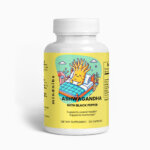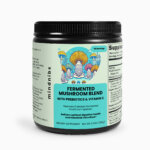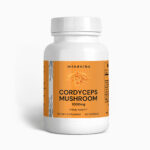
“Fertility and Supplements: What Every Couple Should Know”
Are you one of the countless couples struggling to conceive? Are you looking for natural ways to enhance your fertility? Well, look no further! In recent years, supplements have gained popularity as a simple and effective way to boost fertility in both men and women. However, not all supplements are created equal, and it is important to know what you are ingesting and why. In this article, we will into the science behind fertility and supplements, and highlight the most effective nutrients and vitamins that can assist you in achieving your dream of becoming parents. Trust us, by the end of this article, you’ll be running to your nearest health store to stock up on these powerful fertility-boosting supplements!
1. The Importance of Fertility Supplements for Couples Trying to Conceive
Fertility supplements can provide essential nutrients and vitamins to couples trying to conceive. A balanced diet alone may not provide sufficient amounts of all the necessary vitamins and minerals required for reproductive health. Supplements can help to boost fertility and increase the chances of conceiving a healthy baby.
Supplements containing folic acid are especially important before and during pregnancy. It helps to reduce the risk of neural tube defects in the baby. Zinc and iron are also necessary nutrients for fertility, as they can improve ovulation and increase sperm count. Antioxidants such as vitamins C and E, and selenium are also essential to support the health of eggs and sperm.
Supplements can be used in combination with a healthy lifestyle to help increase fertility. It is important to note that supplements alone cannot guarantee conception, and it is important to consult with a healthcare professional before starting any supplement regimen. Couples trying to conceive should also maintain a healthy weight, avoid smoking and alcohol, and reduce stress levels to optimize their fertility.
2. Understanding the Biology of Fertility and How Supplements Can Help
Having a clear understanding of the biology of fertility is essential, especially if you are trying to conceive. Fertility depends on a complex interplay of various factors, such as hormonal balance, ovulation, and sperm health. For women, the menstrual cycle is composed of different phases, each influencing fertility differently. On the other hand, sperm count and motility are crucial for male fertility. Therefore, it’s necessary to address any underlying issues affecting fertility to improve chances of conception.
Supplements can be valuable additions to your fertility journey. They contain vital nutrients that support the reproductive system, enhance hormonal balance, and promote ovulation. Among the popular supplements for women are folate, iron, zinc, and Coenzyme Q10. Meanwhile, men can improve their sperm count and motility by taking supplements such as vitamin C, vitamin E, and Zinc. However, it’s essential to note that supplements are not a replacement for a healthy diet. Therefore, consult your doctor before taking any supplements to achieve optimal fertility and overall wellness.
Studies suggest that maintaining physical activity and healthy weight can improve fertility. Physical activity increases blood flow to the reproductive organs, while a healthy weight enhances hormonal balance. Additionally, reducing stress levels can lower the chances of infertility. Therefore, incorporating stress management techniques such as meditation, yoga or counseling can promote overall wellness, reducing the chances of infertility.

3. What Makes Fertility Supplements Effective and Safe
Fertility supplements have become increasingly popular in recent years, promising to help improve reproductive health. However, not all supplements are created equal. To determine whether a fertility supplement is effective and safe, it’s important to consider these key factors:
Ingredients: The ingredients in a fertility supplement play a crucial role in determining its effectiveness and safety. Look for supplements that contain a blend of vitamins, minerals, and herbal ingredients that have been shown to improve fertility. Some key ingredients to look for include folic acid, iron, and zinc, which are essential for healthy egg development and ovulation. Other ingredients that may be beneficial for fertility include CoQ10, myo-inositol, and N-acetyl cysteine (NAC).
Quality: The quality of a fertility supplement is also an important consideration. Look for supplements that are made by reputable manufacturers that adhere to good manufacturing practices (GMP) and are third-party tested for purity and potency. This can help ensure that you’re getting a high-quality product that contains the right dosage and combination of ingredients.
Research: Finally, it’s important to consider the scientific research behind a fertility supplement. Look for supplements that have been clinically tested and shown to be effective in improving fertility. While not all supplements will have extensive research to back them up, it’s a good idea to choose supplements that have at least some evidence to support their use.
In conclusion, fertility supplements can be an effective and safe way to improve reproductive health. By choosing supplements that contain high-quality ingredients, are made by reputable manufacturers, and have scientific research to support their use, you can increase your chances of achieving pregnancy and having a healthy baby. However, it’s important to remember that fertility supplements are not a substitute for medical advice and treatment. If you’re struggling with infertility, it’s always a good idea to consult with your healthcare provider before starting any new supplements or treatments.
4. Essential Nutrients and Vitamins to Boost Fertility in Men and Women
Aspiring parents who are struggling with infertility should focus on consuming a balanced diet that contains essential nutrients and vitamins to improve their chances of conceiving a child. Both men and women need to ensure that they take in an adequate amount of essential nutrients to boost fertility. Here are some of the most important nutrients that can help improve fertility in men and women:
- Folate: This vitamin increases fertility in both men and women. It also decreases the risk of birth defects in babies. Women can consume foods rich in folate such as leafy greens, beans, and fortified cereals. Men can take supplements of folate.
- Vitamin D: This vitamin is essential for both men and women’s fertility. It increases testosterone levels in men and improves ovulation in women. Sunlight is an excellent source of vitamin D, and people should get at least 15 minutes of sun exposure daily. Foods rich in vitamin D include fatty fish and fortified dairy products.
- Zinc: This essential mineral is crucial for the production of healthy sperm and egg cells. It also improves fertility in both men and women. Good dietary sources of zinc include oysters, lean beef, and legumes.
Other essential nutrients for fertility in men and women include omega-3 fatty acids, vitamin E, and selenium. A well-balanced diet that includes a wide variety of foods can provide these important nutrients.

5. The Benefits of Taking Fertility Supplements for Both Partners
Fertility supplements have become increasingly popular among couples trying to conceive, and for good reason. These supplements contain a blend of vitamins, minerals, and herbal extracts that can help support reproductive health in both men and women. Some of include:
- Improved egg and sperm quality: Certain vitamins and minerals, like folic acid, zinc, and vitamin E, can help improve the quality of eggs and sperm, increasing the chances of a successful pregnancy.
- Balanced hormones: Hormonal imbalances can be a major obstacle to conception. Fertility supplements containing herbs like maca root and evening primrose oil can help regulate hormone levels, making it easier to conceive.
- Reduced stress: Trying to conceive can be stressful, which can further hinder fertility. Some fertility supplements contain adaptogenic herbs like ashwagandha and rhodiola that can help reduce stress and anxiety.
Another benefit of taking fertility supplements is that they can help address specific fertility issues. For example, if a man has a low sperm count, he may benefit from taking a supplement containing L-carnitine, which has been shown to improve sperm motility and concentration. Similarly, if a woman has irregular periods, she may benefit from taking a supplement containing chasteberry, which can help regulate menstrual cycles.
Overall, fertility supplements can be a valuable tool for couples trying to conceive. However, it’s important to note that they are not a magic solution and should be used in conjunction with a healthy diet, regular exercise, and other fertility treatments if necessary. If you’re considering taking fertility supplements, it’s always a good idea to speak with your healthcare provider first to ensure that they are safe and appropriate for you.
6. The Science-Backed Strategies to Combine Fertility Supplements and Healthy Lifestyle Habits
If you’re trying to conceive, you’re likely to be looking for ways to optimize your fertility. There are numerous fertility supplements available in the market now, but no pill or powder can substitute a healthy lifestyle. Combining your supplements with a healthy diet and lifestyle habits can improve your chances of conception and have long-term health benefits for both partners.
Here are some science-backed strategies to combine fertility supplements and healthy lifestyle habits:
- Eat a fertility diet:The diet should be rich in whole foods, healthy fats, fiber, vitamins, and minerals, and low in processed foods, sugar, and saturated fats. Incorporate foods that support fertility like avocados, leafy greens, nuts, and seeds, citrus fruits, salmon, and eggs. Avoid smoking, alcohol, caffeine, and excessive calorie restriction.
- Exercise moderately:Being physically active is immensely beneficial for fertility, but overdoing it can harm. Aim for at least 30 minutes of moderate activity every day like brisk walking, yoga, or weight lifting.
- Supplement wisely: Not all fertility supplements work alike. Talk to your doctor before choosing a supplement, and ensure that it is science-backed and free from harmful additives. Folic acid, vitamin D, CoQ10, and omega-3 fatty acids are some common supplements that enhance fertility.
Remember, combining fertility supplements with a healthy lifestyle is vital to optimize your chances of conception. By incorporating these strategies into your routine, you are nurturing your overall wellbeing, increasing your reproductive health and, possibly, preparing yourself for an easier pregnancy and delivery.
7. How to Choose the Right Fertility Supplements for Your Needs and Goals
When it comes to fertility supplements, choosing the right one can be overwhelming. With so many options available, it can be difficult to narrow down which supplements will benefit your unique needs and goals. Below are some factors to consider when choosing a fertility supplement:
1. Look for high-quality ingredients: It’s important to choose a supplement that contains high-quality ingredients backed by clinical research. Look for supplements that contain vitamins and minerals such as folic acid, zinc, and iron, which are known to support reproductive health.
2. Determine your needs: Fertility supplements can target specific needs, such as ovulation support or sperm health. Determine what your specific needs are and look for a supplement that addresses those needs.
3. Consider your lifestyle: Some supplements may require multiple doses per day, while others may only require one. If you have a busy lifestyle, it may be easier to opt for a once-daily supplement. It’s also important to consider any dietary restrictions or allergies when choosing a supplement.
In addition to the above factors, it’s also important to consult with your healthcare provider before starting any new supplement regimen. They can help determine if a fertility supplement is appropriate for you based on your health history and any medications you may be taking. With careful consideration and guidance from a healthcare professional, choosing the right fertility supplement can help support your reproductive health and increase your chances of conception.
For couples looking to boost their reproductive health and explore all the options available to grow their family, fertility and supplements can be a useful tool. Whether taken alone or in combination with other treatments, with careful monitoring and advice from a physician, fertility supplements could be the right choice for you. With informed decisions, dedication and an open mind, couples can find the solutions that best suit their needs.

























